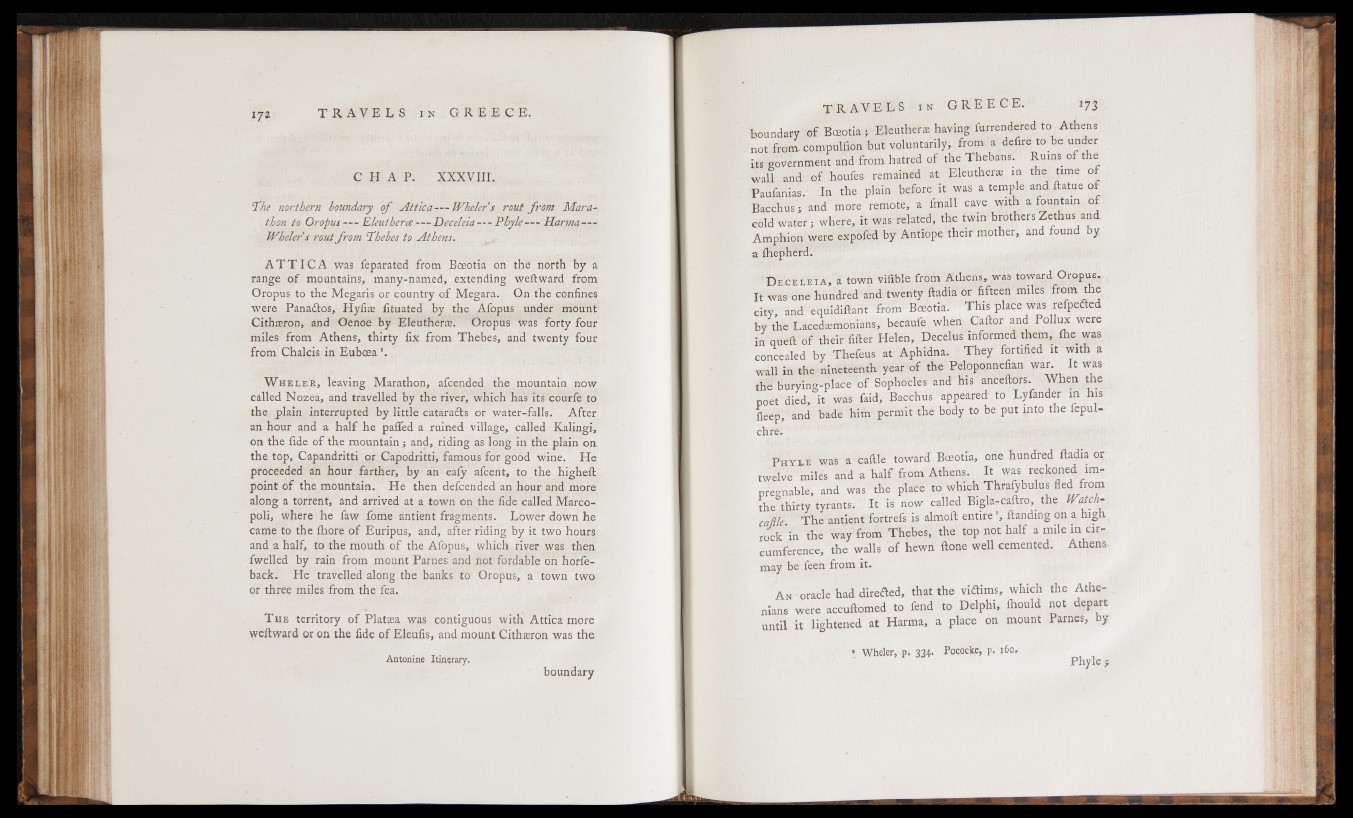
C H A P . XXXVIII.
The northern boundary o f Attica --- Wheler s rout from Marathon
to Oropus — Eleutherce — Deceleia — Phyle - - - Harma—
Wheler's rout from Thebes to Athens.
A T T I C A was Separated from Boeotia on the. north by a
range of mountains, many-named, extending weftward from
Oropus to the Megaris or. country of Megara. On the confines
were Pana^tos, Hyliae fituated by the Afopus . under mount
Cithaeron, and Oenoe by Ele'utherse. ' Orbpul was forty four
miles from Athens, thirty fix from Thebes, and twenty four
from Chalcis in Euboea \
W h e l e r » leaving Marathon, amended, the mountain now
called Nozea, and travelled by the river, which h‘as ifs< courfe to
the plain interrupted by little ca'taradts or"Water-fallsf^*Anei*
an hour and a half he palfed a ruined village, called Kalingi,
on the fide of the mountain j and, riding as loqg in the plain on
the top, Capandritti or Capodritti, famous for'good wine. He
proceeded an hour farther, by an eafy afcent, to the higheft
point of the mountain. He then defcended an hour and more’
along a torrent, and arrived at a town on the fide called' Marco-
poli, where he faw. fome antient fragments. Lower down fie
came to the fhore o f Euripus, and, after riding by it two hours
and a half, to the mouth of the Afopus, which river Was then
fwelled by rain from mount Parnes and not.fofdable ’oh horle-
back. He travelled along the banks to Oropus, a town two
pr three miles from the fea.
T he territory o f Plataea was contiguous with Attica more
weftward or on the fide of Eleufis, and mount Cithseron was the
Antonine Itinerary.
boundary
173
boundary “Of Bceptia ï Eleutherae having furrendered to Athens
not from, compulfion but voluntarily, from, a defire to be under
its government arid from hatred o f ‘the Thebans. Ruips of the
wall and of houfes- remained at -Eleutherae. in the» time ° |
Paufanias. In the plain before it was a terpple and ftatue o f
Bacchus i. and more'- remote, a final! ^eay^ with a fountain o f
cold water; whereat was-related, the twin1 brothers Zethus and
Amphipn were expofed by Afttföpe theirmother, and found by
a fhepherd.
"D e'c e l eTA, a town vifible from Athens^ was towapd G p u s .
It was one hundred and'twenty ftadia orhfteeri miles from the
- c i t y , arid ‘èhüidi^anf iF 6 ^ W ó l l : V !,THis ptëce was refpeéted
b y the- Lacedaemonians*: b e c a u f e .w h e ^ ^ ^ a n d ,P o l l u x w e re
I n 'h u e f t 'o f th e ir filler Helen, Decelus informed them, Ihe was
concealed' B y Thefeus a t Aphidna. They fortified it with a
wall in the nineteenth year of the Peloponnefian war. It was
t h ^ b u r y in ^ E ^ f iopho'cTes arid his anceftors When the .
poet d ied , i t 'was faid, B a c c h u K p p e a r ed * to Lyfander m his
fleep;-‘'arid bade h ib permit th é body to be put fiito the fepul-
ch re . _ ’■
Phyle was a caftle toward* Boeotia,' one lundfed ftadia oy
: twelve mifes add a half from A t t ó It was reckoned im-
pireghable, and was die place'to which Thrafybulus fled from
the thirty tyrants*. It'fis now called Pigla-qaftro, the Watch-,
caffie The antient fortrefs is almoft entire *, Handing on a high
rock in the way from Thebes, the top not half a mile in c i r cumference,
the walls of hewn ftone well cemented. Athens,
may be feen from it.
A n - oracle had directed, that the viétims, which the A th fe ;
nians were accuftomed to fend to Delphi, ftiould npt depart
until it lightened at Harma, a place on mount Parnes, by
» Wheler, p. 334. Pococke, pJ i6o* I I
Phyle ;